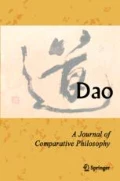Abstract
The concept of the cheng xin in the Zhuangzi claims that the cognitive function of the heart-mind is not over and above its affective states and in charge of them in developing and controlling virtue, as assumed by the Confucians and others. This joint cognitive and affective nature of the heart-mind denies ethical and epistemic certainty. Individual perspectives are limited given habits of thought, attitudes, personal orientations and particular cognitive/affective experiences. Nevertheless, the heart-mind has a vast imaginative capacity that allows the open-endedness and broadening of perspectives.
Similar content being viewed by others
References
Ames, Roger. 1998. “Knowing in the Zhuangzi: From Here, On the Bridge, Over the River Hao.” In Wandering at Ease in the Zhuangzi. Edited by Roger Ames. Albany: State University of New York Press.
Appiah, Kwame Anthony. 2008. Experiments in Ethics. Cambridge, Massachusetts: Harvard University Press.
Brindley, Erica. 2011. “Moral Autonomy and Individual Sources of Authority in the Analects.” Journal of Chinese Philosophy 38. 2: 257–273.
Chan, Wing-tsit. 1963. A Source Book in Chinese Philosophy. Princeton: Princeton University Press.
Chen, Guying 陳鼓應. 1999. A Contemporary Annotation and Translation of the Zhuangzi 莊子今註今譯. Taipei 台北: Shangwu 商務.
Chong, Kim-chong. 2003. “Autonomy in the Analects.” In The Moral Circle and the Self—Chinese and Western Approaches. Edited by Chong Kim-chong, Tan Sor-hoon, and C.L. Ten. Chicago: Open Court.
____. 2008. “Xun Zi on Capacity, Ability and Constitutive Rules.” In Searle’s Philosophy and Chinese Philosophy. Edited by Mou Bo. Leiden: Brill.
Doris, John M. 2002. Lack of Character—Personality and Moral Behavior. Cambridge: Cambridge University Press.
Graham, A.C., trans. 1981. Chuang-tzŭ—The Seven Inner Chapters and Other Writings from the Book Chuang-tzŭ. London: George Allen & Unwin.
Ihara, Craig K. 1991. “David Wong on Emotions in Mencius.” Philosophy East and West 41.1: 45–53.
Knoblock, John, trans. 1994. Xunzi—A Translation and Study of the Complete Works. Vol. 3. Stanford: Stanford University Press.
Lau, D.C., trans. 1992. Confucius—The Analects. Bilingual edition. Hong Kong: The Chinese University Press.
_____. 2003. Mencius. Bilingual edition. Hong Kong: The Chinese University Press.
Leiter, Brian. 2002. Nietzsche on Morality. New York: Routledge.
Li, Disheng 李滌生. 1979. Collected Annotations on the Xunzi 荀子集釋. Taipei 台北: Xuesheng Shuju 學生書局.
Lian, Xinda. 2009. “Zhuangzi the Poet: Re-Reading the Peng Bird Image.” Dao: A Journal of Comparative Philosophy 8: 233–254.
Mair, Victor. 1994. Translated. Wandering on the Way—Early Taoist Tales and Parables of Chuang Tzu. Honolulu: University of Hawai’i Press.
Nivison, David. 1991. “Hsun Tzu and Chuang-tzu.” In Chinese Texts and Philosophical Contexts. Edited by Henry Rosemont, Jr. Chicago: Open Court.
Roth, Harold. 1999. Original Tao—Inward Training and the Foundations of Taoist Mysticism. New York: Columbia University Press.
Shun, Kwong-loi. 2004. “The Person in Confucian Thought.” In Confucian Ethics—A Comparative Study of Self, Autonomy, and Community. Edited by Shun Kwong-loi and David B. Wong. Cambridge: Cambridge University Press.
_____. 2011. “On Anger—An Experimental Essay in Confucian Moral Psychology.” In Zhu Xi Now: Contemporary Encounters with the Great Ultimate. Edited by David Jones and He Jinli. Albany: State University of New York Press. Also in Google Scholar.
Teng, Norman Y. 2006. “The Relatively Happy Fish Revisited.” Asian Philosophy 16.1: 39–47.
Watson, Burton, trans. 1968. The Complete Works of Chuang Tzu. New York: Columbia University Press.
Winch, Peter. 1972. “Moral Integrity.” In Ethics and Action. London: Routledge and Kegan Paul.
Wong, David B. 1991. “Is There a Distinction between Reason and Emotion in Mencius?” Philosophy East and West 41.1: 31–44.
Yan, Hektor K.T. 2009. “A Paradox of Virtue: The Daodejing on Virtue and Moral Philosophy.” Philosophy East and West 59.2: 173–187.
Yang, Rur-bin. 2003. “From ‘Merging the Body with the Mind’ to ‘Wandering in Unitary Qi 氣’: A Discussion of Zhuangzi’s Realm of the True Man and Its Corporeal Basis.” In Hiding the World in the World. Edited by Scott Cook. Albany: State University of New York Press.
Ziporyn, Brook. 2009. Translated. Zhuangzi—The Essential Writings with Selections from Traditional Commentaries. Indianapolis: Hackett Publishing Company, Inc.
Acknowledgment
A National Science Council of Taiwan grant allowed work on this paper at Soochow University 東吳大學 in Fall 2010. I thank Mi Chien-kuo 米建國 for arranging this and for discussing an early draft. I presented Zhuangzi’s view of the xin at the Taiwan Philosophical Association Conference in October 2010, where Norman Teng’s 鄧育仁 comments re-directed my focus onto the cheng xin. The paper was read at the Soochow University conference on “Virtue and Luck: Virtue Theory and Chinese Philosophy” and at National Tsing Hua University, Graduate Institute of Philosophy, Taiwan, in June 2011. Discussions with participants (especially Tan Sor-hoon, Stephen Angle, Huang Yong, Fung Yiu-ming, 趙之振, 吳瑞媛, 陳思廷, 鄭喜恆, and 黃文宏) at both places led to revisions.
Author information
Authors and Affiliations
Corresponding author
Rights and permissions
About this article
Cite this article
Kim-chong, C. Zhuangzi’s Cheng Xin and its Implications for Virtue and Perspectives. Dao 10, 427–443 (2011). https://doi.org/10.1007/s11712-011-9236-z
Published:
Issue Date:
DOI: https://doi.org/10.1007/s11712-011-9236-z




